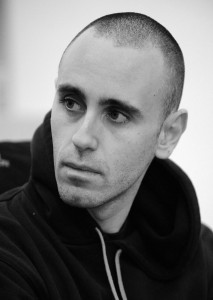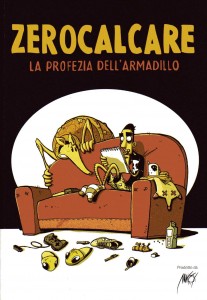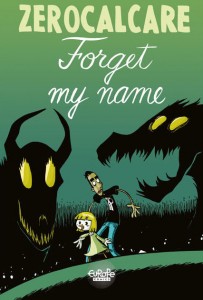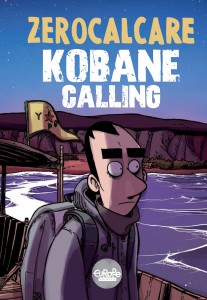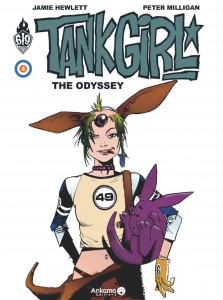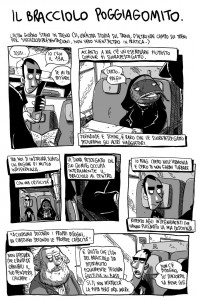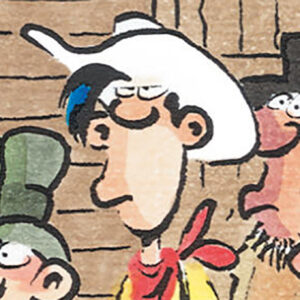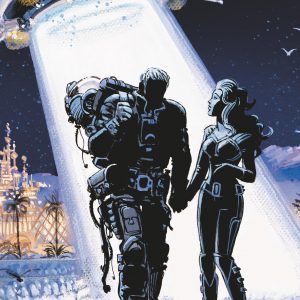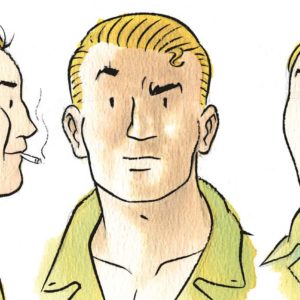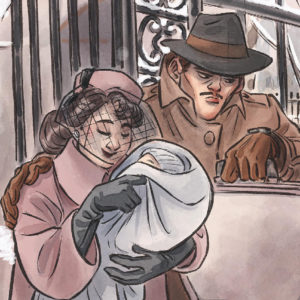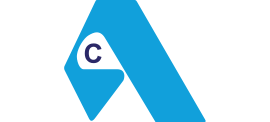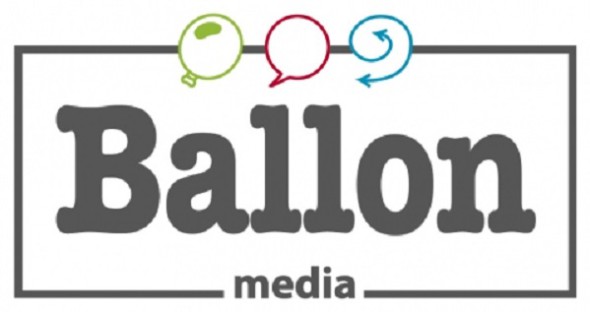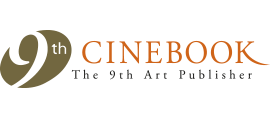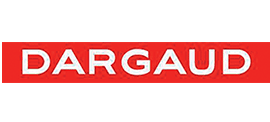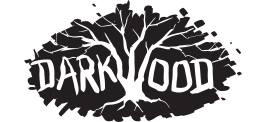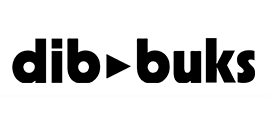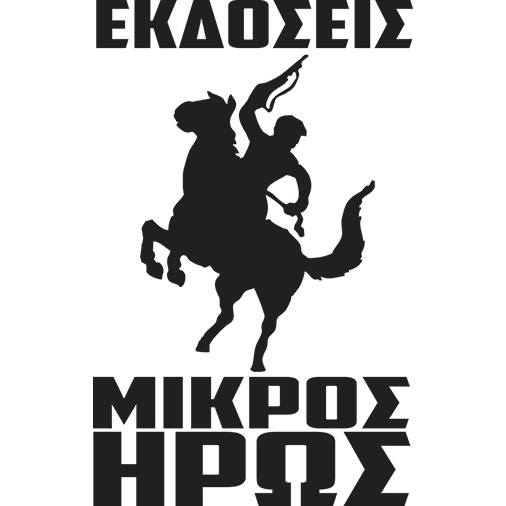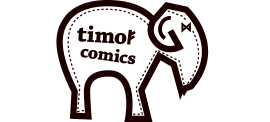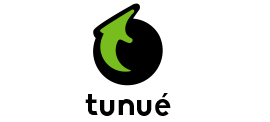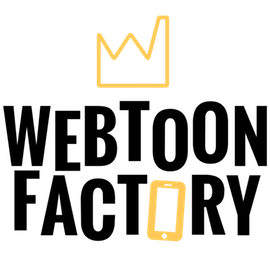Italian author and artist Zerocalcare was born in 1983, and has been creating art ever since, publishing his own work and collaborating with magazines and other artists and authors of all kinds. Zerocalcare has two titles featured in the Europe Comics catalog, Forget My Name and Kobane Calling, and is published in Italy by Europe Comics partner Bao. You can discover the rest of his comics in the original language here.
Buongiorno, Zerocalcare! First off, why comics?
The truth is I’ve always read comics. I’d totally forgotten about this, but at one of my most recent events I saw an old schoolmate, from when we were ten or twelve, and he brought me a 200-page book of comics I’d drawn at school, of my teachers, my friends, etc., all kinds of comics and drawings. So basically I’ve been drawing since forever. The rest is a bit more complicated, in the sense that I had a ton of other jobs before I started making comics for a living. I worked at an airport, I volunteered to do translations, I gave French lessons (I speak French because my mother is French), so loads of things basically… And every time I’d start on a new job, a few months later it’d be over, not because I was a jerk or anything but because they were all temporary contracts. So in the end, since I’d been drawing for so long, I figured why not give it a shot and see what happens. But it was a sort of a process of elimination, not really a lifelong dream. And it ended up working out pretty well.
And your parents didn’t tell you, “Why don’t you find a real job? Forget about comics!”
Oh, yeah, absolutely! The problem was that I’d already tried all those “real jobs” and they were a disaster! [Laughs] In any case, my father was a bit skeptical about the whole comics thing, and in general they wanted me to study and finish college. My mother has a college degree, so for her the idea of having a son who hasn’t graduated from college was like going backwards on the socioeconomic scale. But now she sees that everything is going fine, and she’s happy.
And how did you manage to break through, how did that happen?
At the end of 2011, the self-published version of my book La profezia dell’armadillo (The Armadillo Prophecy, BAO Publishing, 2012) had just come out. Actually, another comics artist called Makkox had paid for it and produced it, and so to promote it, so it would sell—because he’d put in his own money—he told me that I needed to start a blog, and post some of my stories so people get to know me and buy my book. So he started it for me, and posted the first stories—because I was too lazy to do it myself—and it actually went over really well. A lot of people shared the blog, on social networks and whatnot, and it really drove the sales of the book. And then that caught the attention of the publishers, and you know how it goes…
In Europe Comics you have two books, Dimentica il mio nome (Forget My Name), which is a personal journey, about personal growth, with a few fantastical elements, and then Kobane Calling is a bit different, the atmosphere is different, but inwardly it’s perhaps the same journey of coming of age. Are these the recurring themes of your work? Do your stories simply come to you, or is it daily life that pushes you to write?
It’s all centered around my normal daily life, so I write about the things that happen to me. Basically, just as with Forget My Name where the story stems from the death of my grandmother, Kobane Calling arose from a trip I took. The thing is, I can only tell about the things, the emotions I experience, so there is definitely a link between those two and overall I often talk about my anxieties, my fears, my fragility regarding the things that come my way. And then in these books—or at least with Forget My Name—and since I always talk about my personal experiences, one of the things I have experienced very often in my life is nostalgia. Actually a lot of things push me to write, like the loss of loved ones. In fact I’m a bit obsessed by the idea, the fear that twenty years from now, the people close to me—like my grandmother in Forget My Name, or my friend in The Armadillo Prophecy—I’ll forget about them, simply because so many things happen to you in life, you’re so busy… So for me these comics are a way to fix these experiences in a way that I can remember them later on. This goes for most of my books, but also for the experience of Kobane Calling.
Do you think that one day you’ll be able to create stories? That is, write things that are fictional?
I’m not sure… The thing is, when I tried in the past, it didn’t go very well! Let’s say that for now, I’m not able to do it. Actually, what I’m trying to work on right now might be going a bit in that direction, with stories where I’m not the main character and where I try to give the other characters narrative weight as well. But they’re still stories that have been inspired in some way by real people.
Up till now you’ve always worked alone on all of your books. Do you think one day you’ll find a kindred spirit, someone to work with, either for the story or the artwork?
No, for one reason really. I’m not good enough as an artist to really justify a writer choosing me, and if someone asks to work with me, it’s because my name is going around a lot right now, and he wants to take advantage of it. Really when it comes to art, there’s no reason to choose me over a thousand other artists who are better than me. And the same goes for writing, in the sense that I’m not good enough as a writer at coming up with stories to really justify my creating something for another artist. For me, what works is putting together these two things, and for now I plan to stick with that.
Well, that’s your opinion—we’re always most critical of ourselves! And when you were younger, did you ever dream of working with anyone? An important figure, living or dead, your favorite writer, or an idol perhaps?
I have to say that I’ve been extremely lucky in my life because I’ve been able to work with almost everyone I admired artistically. One of these people, an actor I really like, is Valerio Mastandrea, who I worked with in the last few years on the script for a film adaptation of my first book. One of my favorite writers is Joe R. Lansdale, and I drew the cover of his novel in Italy. Really, I’ve been able to do things with a lot of people. One of the people who influenced me the most artistically is definitely Jamie Hewlett, who did the art of Tank Girl and also the graphic identity of the Gorillaz. I doubt he even knows I exist, and honestly I wouldn’t even know what to work on together! But he’s one of the people I like a lot.
And what’s the comics situation like in Italy? Now we’re in France, and you’re pretty familiar with the French market. How would you compare the two comics scenes, in France and in Italy?
In France the market is tremendously bigger. In general it seems to me that almost every style, every kind of story and art has its own space, its own niche in the market. In Italy it’s much more difficult in general. I feel that it was even more difficult when I started making comics about ten years ago, because back then it was hard to do anything other than kids’ comics. The figure of the comic book creator almost didn’t exist, and where it existed, it was hard to make a living from comics in the sense that often it was a hobby alongside other jobs, unless you were working for [Italian horror comic] Dylan Dog, or [Disney weekly comic magazine] Topolino. Outside of that there were very few creators I think who made it on their own. It seems to me that things are changing a bit, that we’re moving in the direction of the French market—still very far away—but the market is growing. If you went to a bookstore ten years ago, there was nothing, and now there’s a whole section for comics and graphic novels. And, paradoxically, even with the economic crisis, it seems to me that publishers are paying larger advances. In other words, it’s starting to become a real profession that people can dedicate themselves to, not just in terms of time but also in terms of care and attention. I think in general it’s a good time to be making comics. My own situation is a bit particular—I’ve been very lucky and really can’t complain. But it seems to me that for everyone else, too, there are new opportunities opening up.
You got started with a blog, so how do you see the future of comics? Do you see it as being linked with digital media, with the Internet, blogs, and video games, e-books?
It’s really hard for me to judge the importance of the Internet and blogs. I was surely very lucky because people read mine. But I was also helped by the fact that Makkox was already well-known and I had his support. Personally, I don’t read comics online because I lose focus in front of the computer, and I don’t have much time, to be honest. I read a lot more comics on paper. The Internet is really such a gigantic sea, discovering things is difficult, and it’s so easy to get lost. So I would say there’s still room for traditional comics, even if at the same time we see e-books starting to replace print books. When I read comics, for example, I’ll go buy a specific book, rather than read blogs. But for literature, I read almost everything in e-book format. Still not for comics, because I think at this point the technology isn’t quite there yet, but as it progresses I think it will take the place of print books.
And your upcoming projects? Do you already have a few, do you have lots of stories waiting to be told?
I have one! [Laughs] I have one, which goes back to Rome, my friends, and everything around me. If I flip back through the comics I’ve done so far and look at the characters—myself, my mother, my friends, etc.—they were crystallized in my first book, when I was 25 or 26, and today, these characters would be different. We’ve changed, we’ve grown, we have different lives, so telling about my life and my friends’ lives today with characters I created ten years ago just doesn’t work. So I’d like to do a book that tells the story of how we are today, who has kids, who has work issues, who’s facing decisions about having kids—I’d like to try to take the tale of my life forward rather than staying fixed on how things were ten years ago.
And finally, why “Zerocalcare”?
Because in 2000 or thereabouts I got in an argument on an Internet forum and I needed a nickname. There was an ad for the laundry soap that has ‘zerocalcare’ (zero limestone), and I picked that. There’s really nothing more to it than that. If I’d known that at the age of 33 I’d still be introducing myself with that name, I would have chosen it better! [Laughs]
Zerocalcare has a monthly comics column on Wired and his blog, zerocalcare.it, is among the most viewed in Italy. His seven books have sold over a half million copies in four years and Forget My Name was shortlisted for the 2015 Strega literary award.
Cover image from Forget My Name © Zerocalcare
